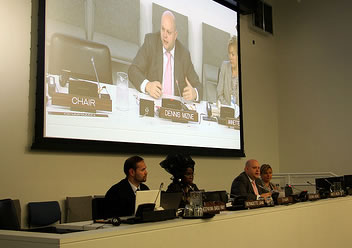
July 13, 2010 | UN Headquarters, New York City
"Facing Violence - Fighting Poverty: How A Robust ATT Can Support Development"
On Tuesday, July 13, 2010, PGA International Council Member Dr. Bernadetter Lahi, MP (Sierra Leone) participated in a Side Event to the First ATT PrepCom in New York hosted by Oxfam, the Norwegian Forum for Environment and Development, and Igarape in cooperation with the Norwegian Ministry of Foreign Affairs entitled "Facing Violence-Fighting Poverty: How a Robust ATT can Support Development".
The panel was moderated by Dennis Minze and Annette Abelsen, of the Humanitarian / Disarmament Section for the Norwegian Ministry of Foreign Affairs. Dr. Bernadette Lahai, MP of PGA and Deepayan Basu Ray of Oxfam joined them on the panel.
Dennis Minze opened by providing his own experiences living in Sao Paulo, Brazil. He discussed the extremely high income inequality and the lack of opportunities, education, health care, and leisure activities for young people as being obstacles to development, which perpetuates a culture of violence. Mr. Minze stated that when one supports community-building and local organizations instead of those who promote violence, and when the state begins to provide basic rights, positive change is forthcoming; "when you get this positive cycle going, it is very hard to stop it." Minze asserted that "it is important to have global rules regulating [the arms trade]" because without a legally-binding ATT, the needs of the communities that need it most are not addressed.
Annette Abelsen then addressed the fact that the overwhelming majority of armed violence is done using small arms and light weapons; in order to be effective, the ATT must reduce the number of incidents of armed violence. Ms. Abelsen noted that more than 2,000 people die daily, either directly or indirectly, from armed violence; Abelsen also highlighted the harm to the community, infrastructure, and means of development as well as to individuals. Abelsen identified reducing armed violence through an international regime. Through the ATT, Abelsen argued that there will be a measurable reduction in arms violence, bringing the world one step closer to improving development.
Dr. Bernadette Lahai MP of PGA discussed the role of armed violence in Sierra Leone and the benefits of a strong and robust Arms Trade Treaty on similar situations. Sierra Leone faced eleven years of armed violence; in those eleven years, over 70% of the population lived in poverty as development slowed significantly. Since the conclusion of conflict, 70,000 ex-combatants have been disarmed and rehabilitated; however, Sierra Leone still faces problems due to remaining weapons falling into the wrong hands. Sierra Leone spends ~25% of its annual budget on security, which Dr. Lahai linked to the fact that Sierra Leone is not likely to achieve any of its Millennium Development Goals (MDGs) by 2015 due to a lack of investment in infrastructure and development. Dr. Lahai then discussed the benefits of an Arms Trade Treaty, arguing that an ATT would complement the domestic legislative process and regional framework already in place through the Economic Community of West African States (ECOWAS). Lahai argued that national legislation and regional conventions can only go so far without the ATT, which she said is "an important evolutionary step" for the international community to help the disadvantaged.
Deepayan Basu Ray noted that the arms trade impacts development through the aggravation of armed violence, undermining post-conflict peace building, stabilization, and victim assistance efforts, and the perpetuation of corruption. Ray supported Lahai's argument of linkage between conflict and development by noting that according to the Global Burden of Violence Report 2008, armed violence has impacted 22 of the 34 countries most likely to miss their MDG targets Ray also underscored that military expenditure does not necessarily facilitate economic growth and actually diverts money from development, which has often led to large international debt Looking forward, Ray argued that the ATT must integrate socio-economic criteria to ensure that arms and ammunition are not transferred if there is a substantial risk that the transfer will seriously impair poverty reduction or socio-economic development
For further information on PGA's work generally on the ATT PrepCom, contact Peter Barcroft, Senior Program Officer, PGA at
